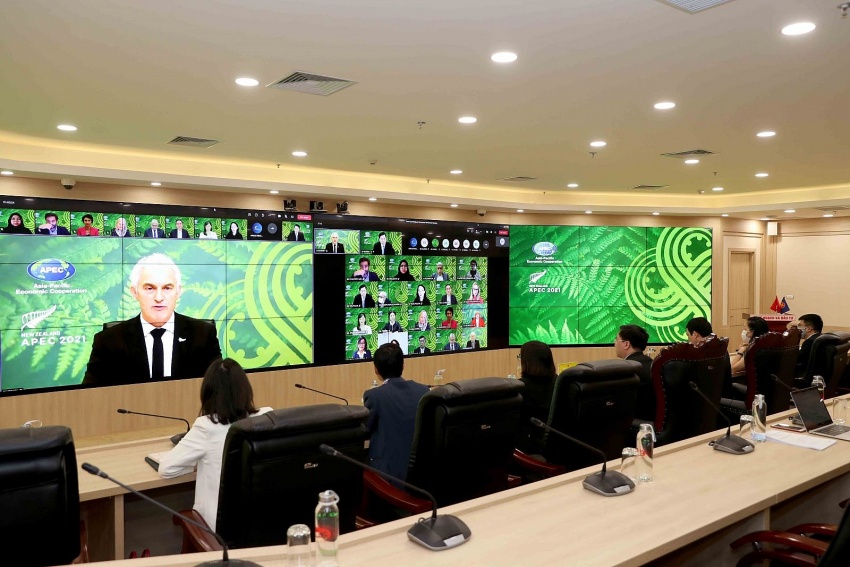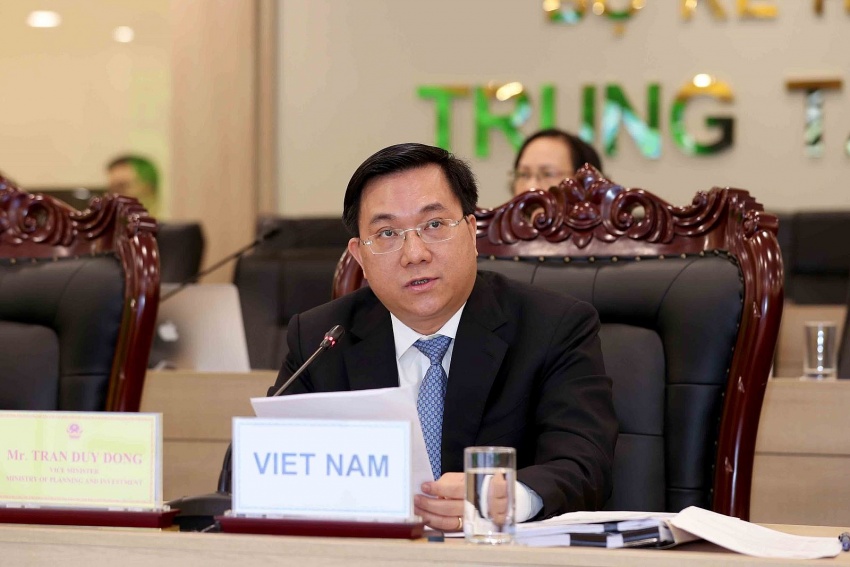SME resilience in APEC with the pandemic and building a sustainable future
 |
| APEC ministers have meet to discuss SMEs, resilience, and a sustainable recovery from the virus. Photo: MPI Portal |
MSME ministers gathered at a virtual meeting yesterday (October 9) chaired by New Zealand’s Minister of Small Businesses Stuart Nash with the participation of APEC countries' ministers, the APEC Business Advisory Council (ABAC), the Pacific Economic Cooperation Council (PECC), the Association of Southeast Asian Nations (ASEAN) and the Pacific Islands Forum (PIF) Secretariat, has already pointed out some solutions to enable SMEs and MSMEs to overcome burdens in the pandemic and plans for the sustainable and inclusive development in future.
Supporting and digitalising MSMEs through COVID-19
More and more difficulties and challenges are piling up due to the inherent limitations of MSMEs, plus the negative impact of the COVID-19 epidemic. The COVID-19 pandemic has been changing people's lives and habits, causing unprecedented difficulties and challenges, forcing manufacturers and consumers to change and adapt. At the meeting, the APEC ministers expressed great sadness over the tragic loss of lives and all the suffering from the pandemic.
In his opening remarks, Stuart Nash reiterated the role of small businesses as "the powerhouses of economies and communities."
"They unite our communities. The survival and resilience of our small businesses through this pandemic is critical to a sustainable economic recovery and maintaining the cohesion of our communities," Nash said.
MSMEs constitute over 97 per cent of businesses in the APEC region, employing over 60 per cent of the workforce and comprising 40 to 60 per cent of economic growth in most economies. Nash urged members to acknowledge the essential role of trade in enabling a strong economic recovery for the region’s small businesses in the face of a global pandemic. "Our economies need to take bold action to enhance MSMEs and start-ups, ensuring access to international markets and supply chains by facilitating an open and inclusive trade and investment environment," he added.
At this time of unparalleled disruption, ministers said they remain committed to intensifying cooperation, capacity building, and the sharing of best practices through APEC. They see the essential role a free, fair, non-discriminatory, transparent, predictable, and open trade and investment environment plays to enhance MSME and startup access to international markets and supply chains; combat the impacts of the COVID-19 pandemic; and enable a strong economic recovery.
Economic and technical cooperation and capacity building can reduce or simplify administrative barriers; promote education, training, and skills development; enhance access to technology; improve access to finance, alternative funding solutions and cross-border payment mechanisms; and promote access to market and regulatory information.
More and more difficulties and challenges are piling up due to the inherent limitations of MSMEs, plus the negative impact of the COVID-19 epidemic. The COVID-19 pandemic has been changing people's lives and habits, causing unprecedented difficulties and challenges, forcing manufacturers and consumers to change and adapt.
In the view of Vietnam's Ministry of Planning and Investment, digital transformation is an inevitable trend and an important solution that SMEs around the world are deploying in order to recover and improve business efficiency and competitiveness in the new context.
"Digital transformation is increasingly effective to help businesses collect data; exploit and manage resources better; help businesses improve customer experience; bring flexibility; adapt and improve efficiency, productivity, profits," said MPI Deputy Minister of Planning and Investment Tran Duy Dong.
Since January 2021, the MPI has been implementing its digital transformation support programme for 2021-2025. It aims to transform the perception, vision, and strategy of enterprises; support the digitization of business activities; digitizing production processes; support the comprehensive digital transformation to create new products, services, and models for businesses.
Agreeing with the MPI, APEC ministers confirmed the critical role of digitalisation, innovation, and technology in promoting MSME resilience and business continuity, fostering the development of digital startup ecosystems and building an enabling regulatory environment. The pandemic has accelerated the process of collaborative innovation and digitalisation, with the adoption of digital solutions no longer optional, but a necessary business tool.
"We pledge to continue to support MSMEs by strengthening digital infrastructure, accelerating digital transformation, narrowing the digital divide, as well as cooperating on facilitating the flow of data and strengthening consumer and business trust in digital transactions. We will work together to promote innovation and digitalisation, including by supporting skills training, access to digital tools and infrastructure, and addressing cybersecurity challenges," noted the joint statement.
 |
| MPI Deputy Minister Tran Duy Dong speaking at the meeting. Photo: MPI Portal |
Inclusive development of sustainable and resilient MSMEs for recovery
The sustainability of SMEs around APEC economies took a toll during the pandemic, resulting in deteriorating resilience and wellbeing of SME owners. Mark van Ommeren, head of the Mental Health Unit, WHO Department of Mental Health and Substance Use acknowledged the impact of the pandemic on social wellbeing and recognising that supporting SME wellbeing builds resilience, increases engagement, and productivity. "We need some cover wellbeing initiatives to build a stronger APEC SME workforce," he said.
APEC economies will focus on recovery efforts that deliver economic opportunity for all members of society, including MSMEs, women, and others with untapped economic potential. They will continue to support women-owned MSMEs to achieve economic and social recovery and enhanced productivity, as well as welcome APEC’s work on implementing the La Serena Roadmap for Women and Inclusive Growth.
APEC countries are encouraging the further promotion of ethical business practices that support MSMEs and will continue to promote transparency and integrity for SMEs in the internationalisation process.
To sustain inclusive development, Vietnam will also need to generate new lucrative income opportunities for low-income people, and to provide more affordable and relevant goods and services, Deputy Minister Dong said. Companies are increasingly interested in expanding their markets towards the base of the income pyramid (the bottom 40 per cent income groups).
Inclusive business models promote inclusive growth by investing in innovative, commercially viable, and growing business models that provide, at scale, relevant and affordable goods and services, or enhanced livelihood opportunities, to people living at the base of the pyramid. "These businesses promote social transformations as they have a large and deep social impact. Inclusive businesses bring triple wins for businesses, the poor, the society, as well as enhance women's economic empowerment to narrow the gender gap," emphasised Deputy Minister Dong.
In the region, the ministers support the implementation of the SME Working Group Strategic Plan 2021-2024 for the inclusive development of sustainable, resilient, and innovative MSMEs. They will collaborate to improve opportunities for MSMEs to compete, specialise, and expand into international markets and global value chains (GVC).
Agreeing with Deputy Minister Dong, Rachel Taulelei, ABAC Chair said that inclusion is about enabling all people to contribute to, and benefit from, economic growth. "By supporting and advancing women and indigenous-led SMEs which have been negatively impacted by COVID-19, APEC economies ensure resilience, sustainability, and inclusivity are part of our recovery and long-term growth strategies," she said.
There has never been a more important time to pursue policies and cooperation that support broader efforts to address future and ongoing environmental challenges, including climate change. To this end, MSMEs have an important role to play in fostering an environmentally sustainable recovery. "We commit to intensifying our efforts to create an enabling environment for MSMEs to engage in innovative, environmentally sustainable practices and activities, and encourage officials to explore the development of cross-fora initiatives in these areas," the joint statement highlighted.
Last year, APEC Leaders endorsed the APEC Putrajaya Vision 2040 for an open, dynamic, resilient and peaceful Asia-Pacific community by 2040. The ministers stand united in the efforts to build connections and deepen their collaboration for a sustainable recovery and to support our MSMEs to excel across the Asia-Pacific.
What the stars mean:
★ Poor ★ ★ Promising ★★★ Good ★★★★ Very good ★★★★★ Exceptional
Related Contents
Latest News
More News
- EU and Vietnam elevate relations to a comprehensive strategic partnership (January 29, 2026 | 15:22)
- Vietnam to lead trade growth in ASEAN (January 29, 2026 | 15:08)
- Japanese business outlook in Vietnam turns more optimistic (January 28, 2026 | 09:54)
- Foreign leaders extend congratulations to Party General Secretary To Lam (January 25, 2026 | 10:01)
- 14th National Party Congress wraps up with success (January 25, 2026 | 09:49)
- Congratulations from VFF Central Committee's int’l partners to 14th National Party Congress (January 25, 2026 | 09:46)
- 14th Party Central Committee unanimously elects To Lam as General Secretary (January 23, 2026 | 16:22)
- Worldwide congratulations underscore confidence in Vietnam’s 14th Party Congress (January 23, 2026 | 09:02)
- Political parties, organisations, int’l friends send congratulations to 14th National Party Congress (January 22, 2026 | 09:33)
- Press release on second working day of 14th National Party Congress (January 22, 2026 | 09:19)

 Tag:
Tag:


























 Mobile Version
Mobile Version